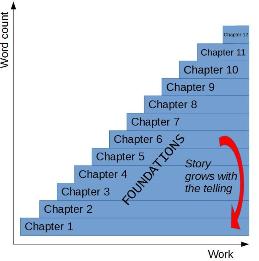Harry Potter and the Tyranny of Word Count

OK I admit it, I put the Harry Potter reference in the title as link bait. Well almost. Take a look at the word counts for each of the Harry Potter books:
- The Philosopher’s Stone – 76,944
- The Chamber of Secrets – 85,141
- The Prisoner of Azkaban – 107,253
- The Goblet of Fire – 190,637
- The Order of the Phoenix – 257,045
- The Half-Blood Prince – 168,923
- The Deathly Hallows – 198,227
(source)
That’s a lot of words, and it illustrates the mountain an author contemplates when we sit down to write a book. Until recently, the length of The Prisoner of Azkaban was pretty much industry standard — 100K words is an economic sweetspot for printing and distribution. Lengths seem to be drifting down of late, because there’s no economy of scale for ebooks.
Who knows? Perhaps we’ll one day return to the sanity of the 35K-word 1970s pulp?
But thirty-five thousand words is still a lot of words!
So it’s natural to look at the project, divide target word count by available days and use that as a measure of progress.
 Word count is what NaNoWriMo is about and it’s the subject of lots of books promising to boost your daily word count. Rachel Aaron’s 2,000 to 10,000 is perhaps best of these, and does contain useful advice about building momentum.
Word count is what NaNoWriMo is about and it’s the subject of lots of books promising to boost your daily word count. Rachel Aaron’s 2,000 to 10,000 is perhaps best of these, and does contain useful advice about building momentum.
However, word count does not really measure progress. There’s two reasons for this.
First, and most obvious, it doesn’t take into account editing time. Sure, if you are a perfectionist, then you will never reach the end of your first draft. However, if your first draft is drivel, you will then spend weeks and weeks editing it. You might have managed a gazillion words a day, but your average word count over the life of the project will turn out to be abysmal.
Second, less obvious but far more important, is the fact that each chapter supports all the succeeding chapters.
Even if you’ve done a lot of planning, your first chapter is also the first time you’ve really put your boots on the ground of your story world. You have to come up with the look and feel of the world, a sense of how the characters speak, and deal with odd practical problems that might not have been so obvious at the planning stage, e.g. if the character is an innkeeper, how come they can leave their inn to go on a quest? And perhaps we need an NCO character to handle the choreography of the ensemble cast. All that takes time.
Your second chapter? Well that comes easier. And the third.
But then the story grows with the telling, and that means it needs more or different foundations. No, of course you shouldn’t go back and tinker, but you still have to make and capture those decisions, establish what’s different. Some people make notes. I tend to stop at a third in and do a story edit/rewrite to establish the book’s direction.
That’s why I’m happy if I manage 1,000 words a day at the start and an average of 3,000 words a day once I’m underway. Sprinting – 5,000 to 7,000 words a day; that’s for the last half. Oh, and if that seems a poor word count, bear in mind that my text doesn’t usually require heavy editing once it’s done (see reason #1).
So, track your daily word count if you must, but don’t let it rule your creative life.
M Harold Page is the sword-wielding author of works such as Swords vs Tanks (Charles Stross: “Holy ****!”). For his take on writing, read Storyteller Tools: Outline from vision to finished novel without losing the magic. (Ken MacLeod: “…very useful in getting from ideas etc to plot and story.” Hannu Rajaniemi: “…find myself to coming back to [this] book in the early stages.”)
Interesting post. The burgeoning word count situation hasn’t really hit the mystery field. That isn’t to say that some books are longer than others. And you can look at long running series’ like Lawrence Block’s Matthew Scudder and see that word count has gone up.
But the Wheel of Time-sized mystery book is pretty uncommon.
Also, trilogies just aren’t a mystery thing, either. I’ve thought about delving into that a bit.
Interesting article. The older I get, the less patience and/or time I have for “doorstop” books. I love the old Ace Doubles and the days of 40-K novels. I’ve been rereading a lot of 150 – 200 page novels. The stories I write are in the 10-K to 25-K “novella” range. My first book was 120-K, but that was only because of the six novellas that make up the book. The other two are both 60-K. My new one is just under 70-K. That’s the length I work best in.
Boy, I can’t tell you how much I hate modern “Word Count” tyranny – almost as much as “Political Correctness” but I’ll not get started there…
Essentially what makes it so I can’t really get into modern scifi/fantasy is the huge word count not the only thing, but essentially:
1. The book’s major plots remind me of online RPG world generators – really google it. Lots of online plot generators meant for old school DM’s who aren’t into writing. If I was a gambling man I’d bet they used them to jumble basic stuff together then hammered out the things.
2. The text, being mentioned here…all that filler. I think it merely modern corporate America and the search for constantly increasing profits combined with the fact that a “Penny a word” ain’t what is used to be.
3. The story – for all that text and how many Mage-ocracies versus Amazon nations versus Orc nation (or scifi tropes or both) and all the dances, characters, etc. is as THIN as the cardboard on the front at best. Oh, sure maybe some reading this would go “i read — and it was the richest, most complex thing I have ever…” – well yes – for characters, plot, a show a wanna be next game of Tolkien Potter whatever…
But what is it, other than pointless entertainment? Where is the Muse? Where is the Bard’s tongue? Whsdere is the poet’s pain and subversiveness?
I hope here at least we’ve all read Robert E Howard’s “The Tower of the Elephant”? If not, please read it – it has been mentioned here. One of the best literary devices ever. REH worked very hard on his era – which were a way of telling historical fiction without dealing with both his limited resources and constant changing and discovering official history. IMO one of the best plot devices out there – the character from the background who tells the history from his eyes briefly to the ingnorant protagonist – the opposite of the “Innocent” character to justify a long winded history from a more in the foreground character.
Myself I consider 50-60K a big “Novel” – of course I am old school “Pulp” and praise the direct to consumer market. I want nice paperbacks, interior artwork, good covers and NOT “Stock” covers. And as far as “PC” goes, well no one is going to hold a gun to your head to buy their book so some author/idea/genre you don’t like, don’t buy it, something might be for you out there – versus monolithic, monopolistic companies deciding what will be made available. Oh, someone could write longer – I have no desire to set “Rules” only to be not held by them, but I wish that if they made a story that long it would be a story not hammering at the word processor to appease a publisher and deal with the economy vs penny a word issue. (I know it’s slightly greater than that these days, but compared to when it started…)
“Some people make notes. I tend to stop at a third in and do a story edit/rewrite to establish the book’s direction.
That’s why I’m happy if I manage 1,000 words a day at the start and an average of 3,000 words a day once I’m underway. Sprinting – 5,000 to 7,000 words a day; that’s for the last half. Oh, and if that seems a poor word count, bear in mind that my text doesn’t usually require heavy editing once it’s done (see reason #1).
Things that show you, that youre not really a writer: If you write less and less towards the end of the book as opposed to more and more…
Thanks for the post! Very interesting 🙂
@peer
I think a diminishing wordcount doesn’t show that you’re not really a writer. It merely shows that you have skills to learn!
Oddly enough, I recommend my book http://mybook.to/StoryTellerTools
@Harold: Thanks for the link, I will take a look 🙂
And its undoubtful true, that I have skills to learn 🙂
But with a day job, a family and a side job (designing board games) writing gets such a small amount of my time, that I dont see myself as a writer – just as someone who writes 😉